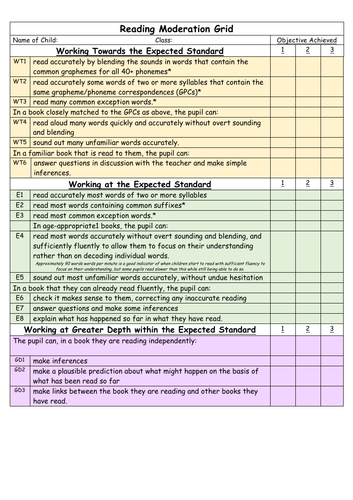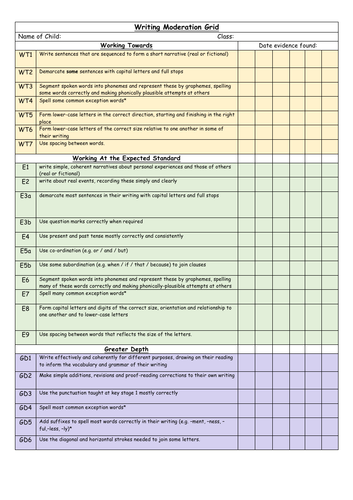
46Uploads
57k+Views
53k+Downloads
English

Year 2 Common Exception Word Spelling Practice
Year 2 Common Exception Word Spelling Practice in the ‘Look, Say, Cover, Write, Check’ format. Can be used as practice in class or sent home for the children to practice as homework. The words have been grouped into similar spelling patterns for ease.
Both the original PDF with the italic font is included as well as the editable Microsoft Word version.

Pre-cursive Handwriting Videos
A collection of videos for the 4 letter families which demonstrate to the children how they should form their pre-cursive letters.
Includes all letters in the:
curly caterpillar letter family
one-armed robot letter family
ladder letter family
zig-zag monster letter family

Common and Proper Nouns Flashcards
This pack contains a range of activities to support children in learning the difference between common and proper nouns. The flashcards can be printed double sided and then laminated so that the children can easily write on them using a white board marker and wipe away once finished.

Year 2 Common Exception Word Starters
Morning starters that allow the children to practice all 64 Year 2 common exception words using the pyramid spelling strategy. Can be used at the start of the day as a soft start when children enter the classroom.
Both SmartNotebook and PDF files of this resource are available in this download.

Year 2 Common Exception Word Flashcards
This pack contains flashcards for the Year 2 Common Exception Words. The flashcards can be made double sided then laminated so that children can easily write on them using a white board pen and wipe once finished. The flashcard requires the children to read the word, trace it, write it and unscramble it.

Pre Cursive Letter Formation Flashcards
This pack contains flashcards to aid children in forming their pre-cursive letters. The flashcards can be printed double sided then laminated, allowing children to write on them with a white board marker and can be wiped away when they have finished using it.

KS1 Compound Word Flashcards
This pack contains flashcards for children to practice learning and spelling different compound words. Although this is part of the KS1 curriculum, it can also be used for struggling learners in KS2. The flashcards can be printed double sided and then laminated so that children can write on them with a white board marker and wipe away easily.

Homophones Flashcards
This pack contains a fun activity for the children to practice learning different homophones. The children need to match each half of the pear to its correct pair of homophones. Each flashcard also has an illustration to support the children in their understanding of that spelling.

Plural and Singular Flashcards
This pack contains a range of activities to support children in learning and spelling different plural and singular nouns. The flashcards can be printed double sided and then laminated so that the children can easily write on them using a white board marker and wipe away when finished.

Contraction Words Flashcards
This pack contains flashcards to aid children in learning and spelling a variety of contraction words. There are 2 different activities: one in which they need to identify and spell the two words that make up the contraction word, and one in which they have to put them together using an apostrophe. The flashcards can be printed double sided and then laminated so that children can easily write on them using a white board marker and wipe away when finished.
Bundle

KS1 English Grammar, Punctuation & Spelling Flashcards
This bundle contains 82 pages worth of activities for the children to practice their grammar, punctuation and spelling in KS1. Many of the activities are also applicable to KS2 and can also be used to support struggling learners in the older years. By purchasing this bundle you will save 5% compared to buying each pack separately.

KS1 Punctuation Flashcards
This pack contains activities for the children to practice learning which punctuation is needed in a variety of sentence types. The punctuation covered in this pack includes: exclamation marks, question marks, full stops, commas. The flashcards can be printed double sided and then laminated so that the children can easily write on them using a white board marker and wipe away when finished.

KS1 Suffix Flashcards
This pack contains a range of activities to support children in learning and spelling different suffixes in KS1. The flashcards can be printed double sided and then laminated so that the children can easily write on them using a white board marker and wipe away when finished.

Lucky Listeners Club Bookmark
Lucky Listeners is a great way to engage children in improving their fluency. The children are provided with a passage (could be fiction/non-fiction/speech/poetry) from their teacher. Their task is to practice reading the passage to as many adults as possible, each time rehearsing their prosody, automaticity and accuracy in order to develop their fluency. Each adult that hears them read records their initials on the bookmark. This is then given back to the teacher who can provide any reward at their discretion before providing a new passage for the week. Each bookmark will last 5 weeks per challenge. This is a useful tool to target key groups of children that need additional support to develop their fluency.

Reading and Maths Teacher Assessment Framework Grids
These grids are the end of KS1 teacher assessment framework statements in a classroom-friendly format that can help with day-to-day assessment of the children as well as support in the collection of evidence for Moderation.

KS1 and Year 2 Writing Assessment Grids and Strips
The Writing Assessment Grid contains the statements for Working Towards, Working At and Greater Depth from the end of KS1 Teacher Assessment Framework. The grid makes assessing against the statements a much more user-friendly task. Simply insert the date in which the child has evidenced that particular statement in their piece of work. The strips can be used in independent pieces of work such as a Hot Task or Big Write. Simply tick off the statement they have achieved, this can then be logged into the main grid by dating the piece of work the evidence has been gained from. Collecting this evidence from the start of the year will also make the process of Moderation a much smoother and quicker process.
















